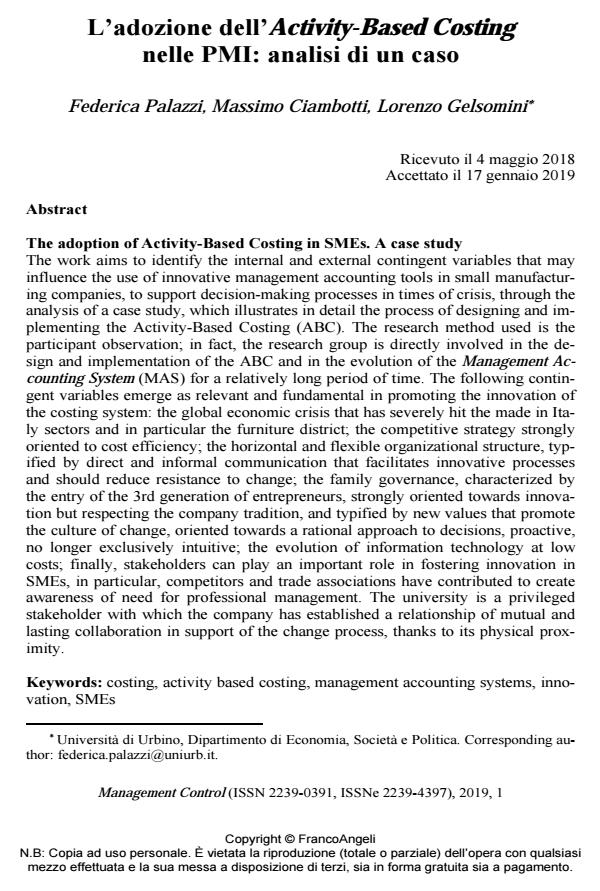L’adozione dell’Activity-Based Costing nelle PMI: analisi di un caso
Titolo Rivista MANAGEMENT CONTROL
Autori/Curatori Federica Palazzi, Massimo Ciambotti, Lorenzo Gelsomini
Anno di pubblicazione 2019 Fascicolo 2019/1
Lingua Italiano Numero pagine 26 P. 97-122 Dimensione file 310 KB
DOI 10.3280/MACO2019-001005
Il DOI è il codice a barre della proprietà intellettuale: per saperne di più
clicca qui
Qui sotto puoi vedere in anteprima la prima pagina di questo articolo.
Se questo articolo ti interessa, lo puoi acquistare (e scaricare in formato pdf) seguendo le facili indicazioni per acquistare il download credit. Acquista Download Credits per scaricare questo Articolo in formato PDF

FrancoAngeli è membro della Publishers International Linking Association, Inc (PILA)associazione indipendente e non profit per facilitare (attraverso i servizi tecnologici implementati da CrossRef.org) l’accesso degli studiosi ai contenuti digitali nelle pubblicazioni professionali e scientifiche
The work aims to identify the internal and external contingent variables that may influence the use of innovative management accounting tools in small manufacturing companies, to support decision-making processes in times of crisis, through the analysis of a case study, which illustrates in detail the process of designing and implementing the Activity-Based Costing (ABC). The research method used is the participant observation; in fact, the research group is directly involved in the design and implementation of the ABC and in the evolution of the Management Accounting System (MAS) for a relatively long period of time. The following contingent variables emerge as relevant and fundamental in promoting the innovation of the costing system: the global economic crisis that has severely hit the made in Italy sectors and in particular the furniture district; the competitive strategy strongly oriented to cost efficiency; the horizontal and flexible organizational structure, typified by direct and informal communication that facilitates innovative processes and should reduce resistance to change; the family governance, characterized by the entry of the 3rd generation of entrepreneurs, strongly oriented towards innovation but respecting the company tradition, and typified by new values that promote the culture of change, oriented towards a rational approach to decisions, proactive, no longer exclusively intuitive; the evolution of information technology at low costs; finally, stakeholders can play an important role in fostering innovation in SMEs, in particular, competitors and trade associations have contributed to create awareness of need for professional management. The university is a privileged stakeholder with which the company has established a relationship of mutual and lasting collaboration in support of the change process, thanks to its physical proximity.
Parole chiave:Costing, activity based costing, management accounting systems, inno-vation, SMEs
- From cost control to cost management: How is the current state of the Italian context? Anna Lucia Missaglia, Alberto Bubbio, Dario Gulino, in MANAGEMENT CONTROL 1/2024 pp.203
DOI: 10.3280/MACO2024-001010 - Democratization Is the Determinant of Technological Change Mario Coccia, in SSRN Electronic Journal /2008
DOI: 10.2139/ssrn.2581745
Federica Palazzi, Massimo Ciambotti, Lorenzo Gelsomini, L’adozione dell’Activity-Based Costing nelle PMI: analisi di un caso in "MANAGEMENT CONTROL" 1/2019, pp 97-122, DOI: 10.3280/MACO2019-001005